
Edgar Ricardo Arjona Morales, known as Ricardo Arjona, is a Guatemalan and Mexican singer and songwriter. He is one of the most successful and best-selling Latin American artists of all time, with more than 20 million records sold. His music ranges from ballads to Latin pop, rock, pop rock, Cuban music, and more recently a cappella performances and a mixture of Tejano music and Norteño music, and Latin sounds. Arjona is noted for his lyrical style, and often addresses topics such as love, sexuality, violence, racism and immigration.

Héctor Eduardo Reglero Montaner, better known as Ricardo Montaner, is an Argentine-born Venezuelan singer. Since starting his career in the late 1970s, he has released more than 24 albums, and many successful singles. He has sold an estimated 10 million records worldwide, making him one of the best-selling Latin music artists.

Franco Atilio De Vita De Vito is a Venezuelan Latin Grammy award-winning singer-songwriter. His first album as a solo artist garnered three Spanish-language hits in Venezuela. He signed with the CBS Records label in 1989, and in 1990, his album Extranjero had a song that reached No. 1 on the United States Latin charts and won an MTV Video Music Award. His 2004 album Stop reached the Top 10 throughout Latin America and on the United States Latin charts. In the United States alone, he has scored more than two dozen hits on the Billboard charts.

Romances is the twelfth studio album by Mexican singer Luis Miguel, released on 12 August 1997, by WEA Latina. It is the third album of the Romance series, in which Luis Miguel covers Latin songs from 1940 to 1978. Aside from Luis Miguel, the production also involved arranger Bebu Silvetti, and Armando Manzanero, who directed all of Luis Miguel's Romance albums. Romances consists of twelve cover versions and two new compositions by Manzanero and Silvetti. Recording took place in early 1997 at the Ocean Way recording studio in Los Angeles, California.

Romance is the eighth studio album by Mexican singer Luis Miguel. It was released by WEA Latina on 19 November 1991. Although the production was originally intended as another collaboration with Juan Carlos Calderón, that plan was scrapped when Calderón was unable to compose songs for the album. Facing a new-material deadline in his recording contract, at his manager's suggestion Miguel chose bolero music for his next project. Mexican singer-songwriter Armando Manzanero was hired by WEA Latina to co-produce the album with Miguel. Recording began in August 1991 at Ocean Way Recording in Hollywood, California, with Bebu Silvetti the arranger.
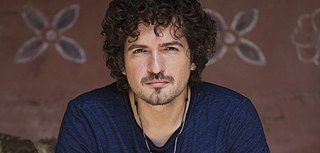
Tomás Torres Carrasquillo, known professionally as Tommy Torres, is a Puerto Rican singer, songwriter, and record producer. Named "#1 Hot Latin Tracks Producer" of 2007 by Billboard magazine and Composer of the Year at 2010 ASCAP's Latin Music Awards, Torres has written and produced songs for many artists including Ricardo Arjona, Jesse & Joy, Ednita Nazario, Alejandro Sanz, Ricky Martin and Alicia Keys.

"Miente" is a song by Spanish singer Enrique Iglesias from his second studio album, Vivir (1997). The song was written and produced by Rafael Pérez-Botija. It was released as the third single from the album in 1997. An uptempo pop power ballad backed by a piano and percussion, the song deals with the singer being in denial about a relationship ending.

"Nunca Te Olvidaré" is a song by Spanish singer Enrique Iglesias for his third studio album Cosas del Amor (1998). It was written by Iglesias with Rafael Pérez-Botija handling its production. A power ballad, it is a confessional song of staying in love through time and other lovers. Upon its release, it was met with generally positive reactions from music critics, although one reviewer was less impressed with it along with the other ballads from the album. The song was featured as the main theme for the 1999 Mexican telenovela of the same name.
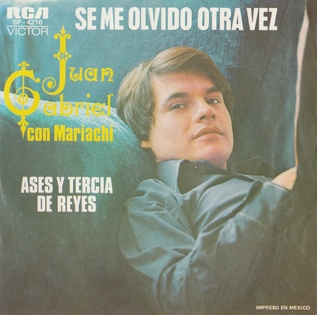
"Se Me Olvidó Otra Vez" is a song written and performed by Mexican singer-songwriter Juan Gabriel for his fourth studio album, Juan Gabriel con el Mariachi Vargas de Tecalitlán (1974). The song is a ranchera number that tells of an awaited but impossible reunion as the singer forgets he is the only one who loved the woman. It was released as the lead single from the album in 1975. The song has been listed as among Juan Gabriel's best songs according to music critics and was one of the best-performing singles of 1975 in Mexico. Gabriel has re-recorded the song twice, the first for his compilation album, Por Los Siglos (2001), and as a duet with fellow Mexican singer-songwriter Marco Antonio Solís on his 28th studio album, Los Dúo (2015).
"La Cima del Cielo" is a song performed by Venezuelan singer-songwriter Ricardo Montaner. It was written by Montaner and co-written and produced by Pablo Manavello and released in late 1989 as the lead single from his third studio album Un Toque de Misterio (1989). The song became the first number-one single for the singer in the Billboard Top Latin Songs chart in January 1990.
Fernando Osorio is a singer-songwriter, born in Bogotá, Colombia, and raised in Caracas, Venezuela.

"Hoy Tengo Ganas de Ti" is a song written and performed by Spanish singer-songwriter Miguel Gallardo. It was released in 1975 as the lead single from his second studio album Miguel Gallardo 2. The song is about a man who tells of his yearnings to a woman who has left. Upon its release, the song was well received in Mexico where it became one of the best-performing songs of the year. Since then, the song has been covered by several artists including Azúcar Moreno, Ricardo Montaner, David Bustamante and Alejandro Fernández.

Mau & Ricky is a Venezuelan Latin pop and reggaeton duo formed by singer-songwriter brothers Mauricio Alberto "Mau" Reglero Rodríguez and Ricardo Andrés "Ricky" Reglero Rodríguez, both sons of Argentine-Venezuelan singer Ricardo Montaner.

"Agua Dulce, Agua Salá" is a song from Spanish singer Julio Iglesias's studio album La Carretera (1995). The song was written by Estéfano, Donato Poveda, and Hal Batt and produced by Ramón Arcusa. It was released as the lead single from the album in 1995. A rumba flamenca, the song deals with the theme of life. The song received positive reactions from music critics, mostly being found catchy by them. It was a recipient of the ASCAP Latin Award in 1996. Commercially, the song peaked at number three on the Hot Latin Songs chart and number one on the Latin Pop Airplay chart in the United States. A music video for the song was filmed in Spain and features Fabiola Martinez. Iglesias also recorded it in Portuguese as "Água Doce, Água do Mar" for his studio album Ao Meu Brasil (2000).
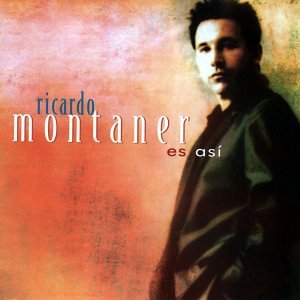
Es Así is the ninth studio album released by Ricardo Montaner. It is his first album to be released under WEA Latina. The self-titled track became his first number one song on the Latin Pop Airplay chart. "La Mujer de Mi Vida" was featured as the theme song for the 1998 Venezuelan telenovela of the same name. "Para Lloar" was one of the recipients of the 1999 ASCAP Latin Awards on the Pop/Ballad category.
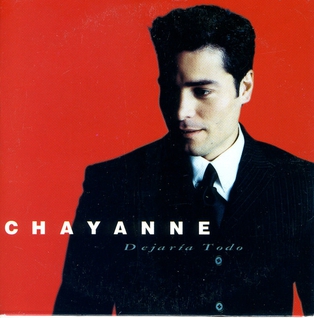
"Dejaría Todo" is a song by Puerto Rican singer Chayanne from his ninth studio album, Atado a Tu Amor (1998). The song was written and produced by Estéfano and released as the lead single from the album in September 1998 by Sony Discos.The rock ballad details everything the singer is capable of doing for his lover. The song received generally positive reactions from music critics and is listed among Chayanne's best songs. A music video for the song was filmed and features a dark scenery. Commercially, it topped the Billboard Hot Latin Songs and Latin Pop Airplay charts in the United States. The track was nominated for Pop Song of the Year at the 11th Lo Nuestro Awards and Song of the Year at the inaugural Ritmo Latino Music Awards in 1999 and was acknowledged as an award-winning song at the 2000 Broadcast Music, Inc. (BMI) Latin Awards.
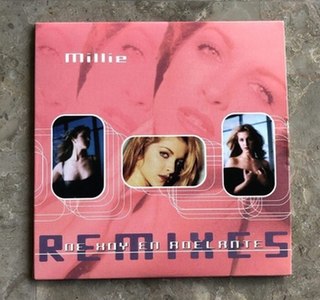
"De Hoy en Adelante" is a song by Puerto Rican singer Millie Corretjer from her third studio album, Amar Es un Juego (1999). It was released as the second single in 1999 and became her second #1 on the Latin Pop Airplay chart and her first on the Hot Latin Songs chart in the US. El Norte Deborah Davis favorably compared it to Cher stating that the artist "taps into the rich vein that has served Cher so well in recent months: emotionally surviving marital disasters. So if you're a woman looking for another battle hymn, turn to Millie ASAP." El Nuevo Herald's Eliseo Cardona cited it as one of the tracks where Corretjer as the "plate having salvageable parts" on the album. It was recognized as one of the best-performing songs of the year at the ASCAP Latin Awards under the pop/ballad category in 2000.
"Desnuda" is a song written and performed by Guatemalan singer-songwriter Ricardo Arjona for his seventh studio album, Sin Daños a Terceros (1998). It was released as a single in 1999. It became his first number-one song on both the Billboard Hot Latin Songs and Latin Pop Airplay charts in the United States. It spent 12 weeks at number one on the latter chart, tying with his other song "El Problema". The song would later become the theme song for the Mexican telenovela Tres mujeres (1999). It was recognized as one of the best-performing Latin pop songs of 2000 by ASCAP. Mario Tarradell of the Dallas Morning Morning News described it as one of the album's "eclectic, provocative cuts". "Desnuda" was nominated in the category of Pop Song of the Year at the Premio Lo Nuestro 2000, but lost to "Livin' la Vida Loca" by Ricky Martin. In 2007, Arjona revealed the origins of the song. The music video was directed by Benny Corral. Although a friend of Arjona, Costa Rican model Vica Andrade declined to appear on the music video.
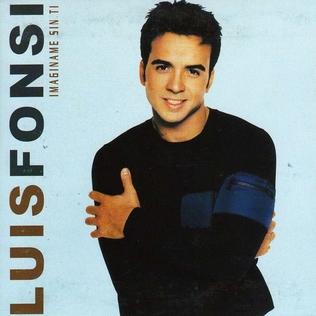
"Imagíname Sin Ti" is a song by Puerto Rican singer Luis Fonsi from his second studio album, Eterno (2000). The song was written by Rudy Pérez and Mark Portmann, with the former handling its production. It is an R&B-tinged ballad about the singer moving away from his lover and realizing he cannot live without her. Fonsi also recorded an English-language version of the song titled "Imagine Me Without You", which was produced by Veit Renn. The accompanying music video for the Spanish version was filmed by Marlene Salomé and filmed in Venezuela.
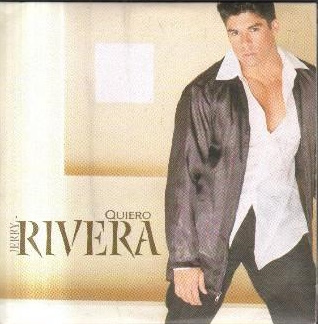
"Quiero" is a song by Puerto Rican singer Jerry Rivera from his 11th studio album Rivera, (2001). The song was co-written by Martha Cancel, Ray Contreras, and James Nicholas Greco and produced by Bebu Silvetti. It is a pop ballad in which the singer pays homage to women. A salsa version of the track was also recorded which was arranged and produced by Ramón Sánchez. It was released in January 2001 by BMG US Latin as the lead single from the album in January 2001. A music video for "Quiero" was directed by Juan Basanta and features Rivera in various background flirting with a woman.

















